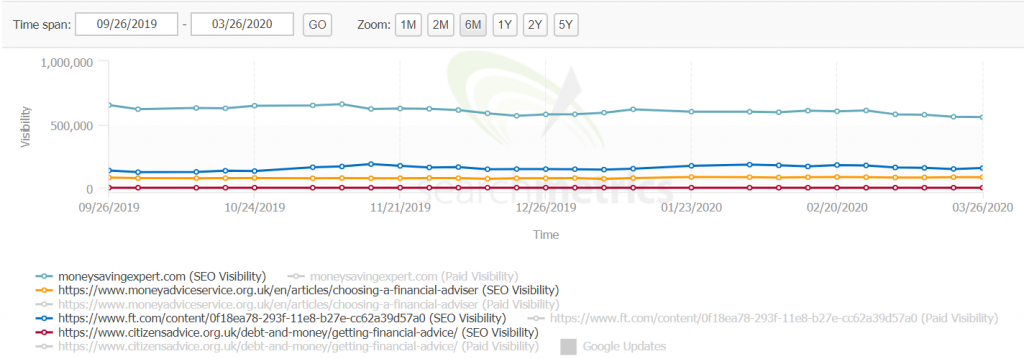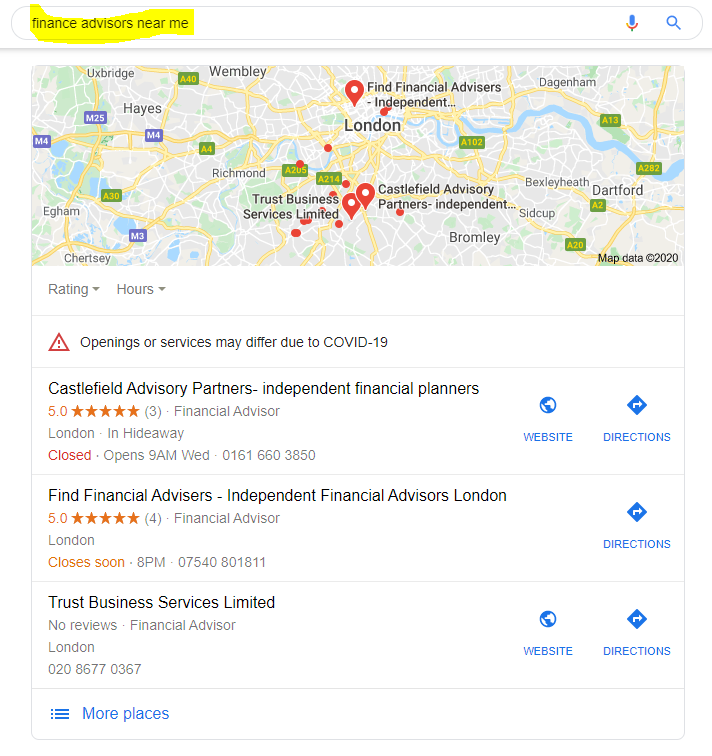Finance is an ever-green industry. At the time of writing this guide, we are in the middle of this COVID-19 pandemic and it’s not going away anytime soon. The state of the economy is in tatters. No one is going online looking to buy new clothes or book flight tickets. Most people at this point would be looking for financial advisors to seek wealth management advice or to understand the new government policies like the furlough policy for example. This is the right time for all the finance businesses to invest in SEO.
I have personally avoided the finance and insurance industry during my job searches. Partly because of the jargon you need to be familiar with when you work for a financial firm. And the finance sector is very competitive online with the top of the Google SERPs filled with high CPC paid ads, high street and online bank sites, comparison websites like MoneySuperMarket, premium financial advice sites like MoneyAdviceService, MoneySavingExpert, private advisors and lenders and more. But that does not mean, you can’t outrank some of these premium sites in niches if you have the right SEO strategy and best practice SEO guidelines are followed. If you have reached this post, you are either a financial advisor or financial service business looking for SEO advice to optimise your organic visibility.
So, what’s the objective of my Financial SEO guide?
- Help finance firms get new clients through SEO.
- Improve your financial website rankings on search engines such as Google, Bing etc.
- Show up for your business name or “financial advisor + city” searches in your local area.
- Make some savings from otherwise expensive high CPC “financial advisor” terms. Example: Google ads for “financial advisor London” is $9.08 per click. Let’s say, SEO for these keywords gets 25 clicks per month. That’s free traffic worth around $200. The goal is to spend less on paid advertising and invest in increasing organic traffic.
Let’s look at some of the top search terms in the finance industry. “Wealth management” gets about 6600 searches per month in the UK. The sites that rank well for wealth management are SJP, Coutts, Barclays, RBCWealthManagement. Let’s look at their SEO visibility using SearchMetrics. The site that dominates is Barclays for “wealth management” related terms in terms of online SEO visibility.

Next, let’s take a look at the search term “financial advisor” (gets 27100 searches per month in the UK) to see who dominates in terms of SEO visibility using SearchMetrics. The sites that rank well for financial advisors are moneysavingexpert.com, moneyadviceservice.org.uk, ft.com, citizensadvice.org.uk and unbiased.co.uk. The site that dominates is moneysavingexpert.com for “financial advisor” related terms in terms of online SEO visibility.

Other popular terms include “small business loans”, “retirement savings”, “PPI Claims”, and “Insurance or loans keyword variations etc which are popular services provided by financial firms. Many prefer to work with smaller wealth management consultants or financial advisors closer to where they live so they can meet the person in charge of their money. These people simply look for services in the local pack. The local pack is a great source of leads, especially for people looking for financial services and advice in your local area. One of your strategies should be to get people who use your services to add a review of your service to your local listing.
A finance site needs to be quick. Does it need to be quick for search engines? No, it needs to be quick for users. This knock-on effect will be rewarded by search engines. Users enquiring about industries like PPI Claims, Insurance or Loans want an instant decision. If you have a slow form this will have a negative impact on your bounce rate, which is a ranking factor.
SEO Tips for Financial Services Websites
The principles of financial services SEO whether big or small financial firms are very similar to other industries with a few subtle differences. Some of the standard best practices of SEO for the finance and banking sector are listed below;
- The website should load fast and secure (HTTPS enabled). Ideally, your pages should load in 3 seconds or less. A slow site can negatively affect the user experience and cause a high bounce rate. Page speed is in fact one of the ranking factors that Google cares about. There are various tools you can use to test your website speed. These are the website speed test tools I use for my clients;
- The website should be mobile-friendly and should be designed with mobile-first in mind.
- The site pages should be optimised for content on the page, unique title and meta description using your target keywords. Also, try to adopt keyword-rich URLs for your site pages.
- Use keyword research tools like SEMRush or Ahrefs to perform keyword research around various finance topics. This keyword research will also help put together a content plan and site structure. I have listed some top keywords for finance-based sites. There are free tools available like Google’s Keyword Planner or tools like Keywords Everywhere that you could use to perform keyword research. A sample of top keywords from the most popular searches in the finance sector is placed below.

- You should claim your local presence on Google My Business, Bing Places etc. Ensure your NAP information (name, address, contact number), business opening hours, business photos and the description of your business are accurate and kept up to date. Encourage your clients to add reviews on your local listing. Optimising your business description with your target keywords is a small ranking factor. Don’t forget to link to your financial services website so people can click to see your website. And do connect to your social media profiles as they get displayed on the knowledge panel.

- Update relevant niche local directory listings with your business information. Some good examples include having your presence on yellowpages.com, yelp.com, wallethub.com, wealthmanagement.com, insidermedia.com, financialservicedirectory.com, wiseradvisor.com, cpadirectory.com etc.
- Content is the cornerstone of SEO for financial services. Create content to optimise for long-tail keywords and produce high-quality content on a regular basis. Google looks at content freshness and quality as one of the factors to rank your posts over others. You can review the “people also ask” or the “keywords related to” sections on Google SERPs to understand what your target audience is searching for. Create articles to answer search intent and answer people’s queries.
- Write about topics that have search demand and that your visitors would find useful.
- The finance industry is complex with so much jargon that makes it difficult for someone not familiar to easily grasp. As a site owner, you would probably create infographics or videos to explain each area of finance. If you do adopt images and video in your content strategy, ensure you optimise the image alt tags, and image file name as a bare minimum.
- Quality backlinks are an important factor.
- Hire a developer to identify and fix coding errors on your site.
- Monitor and fix broken links from time to time and have a custom 404 page so users don’t see an ugly server error page. Redirect broken links to appropriate new or relevant pages.
- You should perform some amount of competitor analysis to understand why your online finance competitors are ranking above you for target keywords.
FURTHER READING OR VIDEOS WITH THE BEST SEO FOR FINANCIAL ADVISOR’S TIPS
I hope this gives you a good starting point to improve SEO for financial services online. If you are a financial advisor or financial SEO company looking for SEO services, Contact me today!

